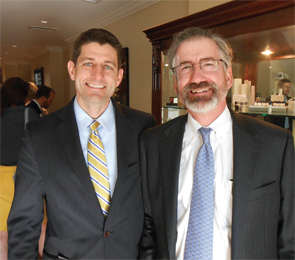
RheumPAC is the political action committee (PAC) of the ACR that was authorized by the Board of Directors approximately eight years ago at the urging of current ACR President Joseph Flood, MD.
PACs come in many forms; yours is a medical specialty society committee that represents the interests of all rheumatologists and their patients. It is part of the ACR’s advocacy arm in conjunction with the Committee on Government Affairs (GAC). It has increased our ability to have face-to-face dialogue with influential representatives and senators. In this way, we are able to present our issues, as defined by the GAC and the Board of Directors, directly to members of Congress. The importance of this is illustrated in our successful efforts to put forward legislation that will benefit our patients and profession. Here are some examples:
First, the idea of loan repayment for pediatric rheumatology fellowship trainees came from the GAC. Many of us had conversations with Sen. Sherrod Brown (D-Ohio) because of the access afforded by your PAC. When the Affordable Care Act was written, Sen. Brown expanded the idea to include other cognitive pediatric fellowship trainees.
Second, the Patients’ Access to Treatments Act (PATA; H.R. 460) was also proposed by the ACR, with the help of our lobbyist, former Sen. Tim Hutchinson. Because of the in-person contacts we have made with members of the House of Representatives, GAC Chair William F. Harvey, MD, MSc, was able to give direct live testimony in a committee hearing. A number of your colleagues have had conversations with other House and Senate members about PATA.
Third, members of the House and Senate and their legislative aides ask for the ACR’s opinion about health-related legislation. This gives us input and equal access to our legislators, similar to the levels of such large medical societies as the AMA.
These are just some of the many examples of how your donations are used to Advance Rheumatology!
Donations & Dispersal
We are often told that ACR members do not want to contribute because they don’t want to donate to elected officials whose political views are contrary to their own or because they are concerned about partisanship. The answer is that in 2013, our contributions were almost evenly dispersed among the two major political parties. We still have to move our legislative agenda forward; only those who are in Congress can do this.
